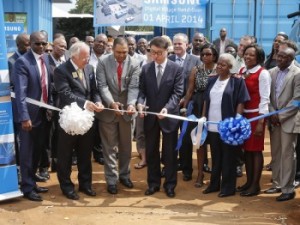Samsung Electronics officially handed over its Digital Village, which aims to improve the lives of Africans through renewable and environmentally sustainable solutions that harness the power of the sun.
 The flagship village, first unveiled in October 2013, is set up in Malibongwe Ridge, and provides the community with much-needed education and health services.
The flagship village, first unveiled in October 2013, is set up in Malibongwe Ridge, and provides the community with much-needed education and health services.
“Everyone speaks of the need to bridge the digital divide, but we can only really achieve this if we focus on the core objective of changing lives for the better,” said George Ferreira, VP and COO, Samsung Electronics Africa. “The United Nations says being online is now seen as fundamental to human development, and access to the Internet may soon become a basic human right, like access to water. Our challenge was to look at what was needed versus what was available and devise a plan that connected the two.”
The Samsung Digital Village model addresses one of Africa’s largest economic challenges – electrification. On average, less than 25% of rural areas on the continent benefit from electricity, resulting in isolated communities with limited access to education, healthcare and connectivity – all of which are key to socio-economic upliftment.
The Digital Village comprises:
· A Solar Powered Internet School – the exclusively solar-powered, mobile and completely independent classroom aims to increase accessibility to education and connectivity across Africa. It is designed for use in remote rural areas with limited or no access to electricity. Built in a 12-metre-long shipping container, the school’s solar panels provide enough energy to power the classroom’s equipment – including Samsung Notebooks and Netbooks, an Interactive Whiteboard or E-board, Samsung Galaxy tablets and more. The school can accommodate up to 24 learners and has applications beyond traditional schooling – it can be used as an adult education centre in the afternoons or as a community centre on weekends.
· A Solar Power Generator – the generator provides easy, affordable power accessibility to schools and community centres across Africa. The generator will drastically reduce the community’s energy bill, freeing up funds that can be used for more pressing concerns, such as infrastructure. It provides sufficient electricity to power a complete e-learning centre comprising netbooks, printers, an E-board, lighting and other classroom peripherals.
* A Solar Powered Health Centre – the health centre provides a variety of eye, ear, blood, dental and pre- and post-natal screening and treatments to the community. A ‘Mother and Child’ centre will specifically provide medical services to mothers and their babies. The units were designed to eliminate the economic and geographical boundaries that prevent people in rural communities from accessing quality medical treatment. The centre is able to move between areas to provide a range of medical services to the public. It will also focus on educating the community about health issues and encourage them to take tests as preventative measures.
* A Solar Powered Tele-Medical Centre – through the Tele-Medical Centre, the community has access to remote medical assistance through a centralised pool of medical expertise and experience. It reduces the need for qualified medical doctors in rural areas, of which there is a dire shortage, and reduces travel distances for community members. Advantages include faster diagnostic response times and reduced costs for rural inhabitants. The centre will work in conjunction with the Samsung Tele-Medical app, which will guide nurses through the necessary processes to ensure all relevant information is captured.
* A Solar Powered Admin Centre – to be used as an administration office by staff members.
“We have set an ambitious goal for ourselves in Africa: to positively impact five million lives by 2015,” says Sung Yong Hong, President and CEO of Samsung Africa. “We believe that this can most effectively be achieved if we connect our corporate citizenship initiatives with our history and core business. With the goal to grow our business on the continent, we also know that we have to sustain our level of innovation. This can only be achieved if we invest in education to facilitate African thought leadership.”
“Today, we are seeing an innovation we’ve worked hard on developing come to life, and it is very exciting,” says Ferreira. “Good health is at the centre of one’s wellbeing and impacts society at a fundamental level. It affects a child’s ability to learn at full potential, and adults’ ability to provide for their families. This is why we have complemented our strong focus on education with a focus on quality healthcare.”
Samsung signed a memorandum of understanding (MoU) with the Gauteng Department of Economic Development (DED), which is committed to exploring and investing in green technologies for green economies – and the Digital Village model aligns with this vision.
“We are encouraged by the work Samsung is doing in the green technology space. This type of out-of-the-box thinking is what will make a measurable and meaningful difference in people’s lives and, ultimately, change the world. The Digital Village aligns with government’s vision of finding alternative solutions to African problems, and we are proud to be a part of it,” says Mr Albert Chanee, head of the DED.
Samsung and the department were inspired by the work of the Fodisong Community and Health Centre, a non-governmental organisation that has provided healthcare services to the Itsoseng community since 2010. The partnership will see the expansion of health and educational services within the community.
“We appreciate that Samsung recognises our hard work and contribution to the community. We are immensely grateful for this Digital Village, which will further our efforts and ensure more people receive access to life-saving medical treatment,” said Mr Hans Ludolph, Founder and Leading Member of Fodisong.
Samsung also partnered with Right to Care, a non-profit organisation that supports and delivers prevention, care and treatment services. It will specifically provide male circumcision as a preventative health measure. “We are excited to work with Samsung on this uplifting and inspiring project,” says Right to Care’s Dr Mashudu Munyai.















